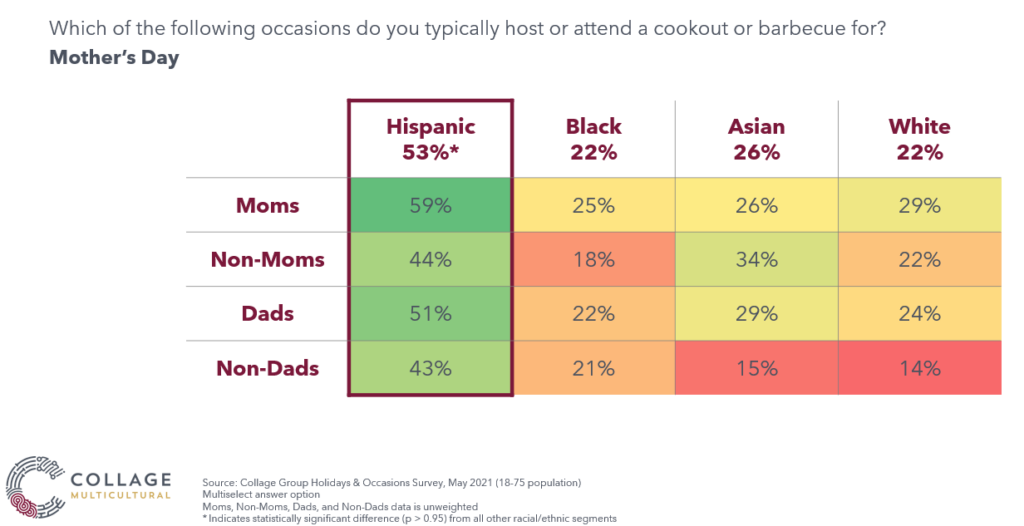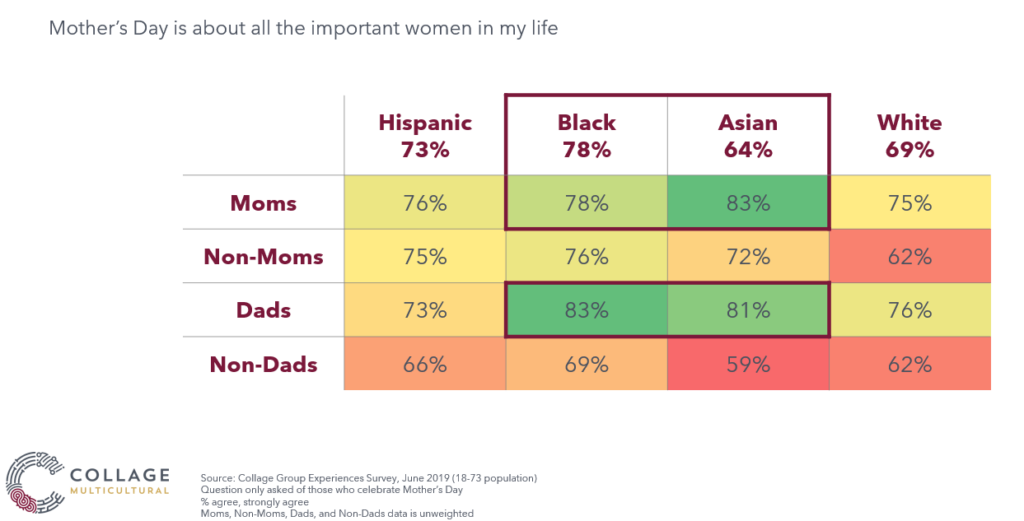How Multicultural Americans (Moms, Dads, and Non-Parents) Celebrate Mother’s Day and El Día de las Madres

Mother’s Day is an important holiday for Americans of all backgrounds, but Multicultural segments—especially moms and dads versus non-parents—have nuanced attitudes and celebration styles. Read on for insights curated from our Holidays and Occasions research.
Mother’s Day is one of Americans’ most beloved holidays. It’s a day dedicated to Moms (and maternal figures), honoring their important role in the family. 85% of Americans celebrate it, with an especially strong emphasis from Hispanic Americans (91%). Mother’s Day has the fourth highest average per-person spending of any holiday or occasion according to the National Retail Federation. Mother’s Day occurs every second Sunday of May, which means this year (2022), it will be on May 8th.
Fill out the form for a few key insights and implications.
However, it’s important to note that while motherhood is celebrated all over the world, it doesn’t always occur on the same date as it does in the United States. For instance, some Latin American countries such as Mexico, El Salvador, and Guatemala celebrate Mother’s Day (El Día de las Madres) on May 10th every year. Many Hispanic-American consumers with heritage from these countries, especially Bicultural and Unacculturated, may prefer to uphold the tradition on the day from their country of origin instead of—or in addition to—the date Mother’s Day is celebrated in the United States. So, this is an important nuance not to be overlooked when activating on multicultural consumers. Plus, it offers an additional day to connect with your brand’s target consumer groups!
As your brand strategizes on how best to resonate with multicultural consumers, take note of the key similarities and differences in how each racial and ethnic segment (as well as differences among Parents and Non-Parents of each demographic) perceives of and celebrates Mother’s Day. Download the attached presentation and read on for key insights and takeaways.
Key Insight #1:
Hispanic Americans are highly involved on Mother’s Day, and this is true for both Parents and Non-Parents. They have higher celebration rates compared to other segments and are usually more likely to participate in celebration activities like hosting a barbecue/cookout, giving cards, and buying gifts.

A Deeper Look:
For Hispanic Americans, Mother’s Day is a family affair. Everyone comes together to honor the matriarch of the family. “It’s important to celebrate mothers because they are the building blocks of the family and they are the teachers,” says Maria Miranda, assistant director of the Arizona Latino Arts and Culture Center. Typical celebrations include extended family gatherings with plenty of food, music, and flowers.
Collage Group’s research on Family Connection underscores the importance of family relationships for Hispanic Americans. Mother’s Day is a natural extension of the segment’s love and appreciation for close family bonds and festive gatherings.
Action Step:
Acknowledge Hispanic Americans’ culturally-dual Mother’s Day celebrations, including the difference in celebration dates, through your marketing efforts. Incorporate the nuances that Hispanic Americans consider meaningful aspects of the holiday, such as large family gatherings with food and music.
Key Insight #2:
Black and Asian parents (both Moms and Dads) feel especially strongly about celebrating ALL the women in their life for Mother’s Day.

A Deeper Look:
Our research on Cultural Traits has showed us that these two segments are highly community-oriented, which likely explains their stronger association with Mother’s Day as a holiday honoring all women. Parents of these segments are particularly attuned to the role that other women in their communities play in raising their children, such as sisters, aunts, cousins, Godmothers, and friends.
For the Black segment, celebrating all women may be driven by the community’s history of adversity and the necessity to create a strong network of support for one another. It’s possible that as many Black Americans become parents themselves, they reflect even more strongly on the role that many women in their community had played in helping to raise them.
For the Asian segment, celebrating all women may be driven by the segment’s cultural emphasis on respect and humility. Many Asian countries are more collectivist, meaning that social norms prioritize the community over the individual. This may help explain why Asian Parents would be more likely to want to recognize the contributions of all women on Mother’s Day.
Action Step:
Create cross-cultural appeal by expanding your brand’s Mother’s Day marketing efforts to be inclusive of all women that play an important maternal or supporting role in the family. Connection with others is a theme that consumers across backgrounds resonate with universally. Be sure to infuse authentic cultural cues and segment-specific nuances to connect deeply both within segments, as well as across segments.
Contact us via the form below to learn more about how you can access deeper insights on our Cultural Intelligence Engine.